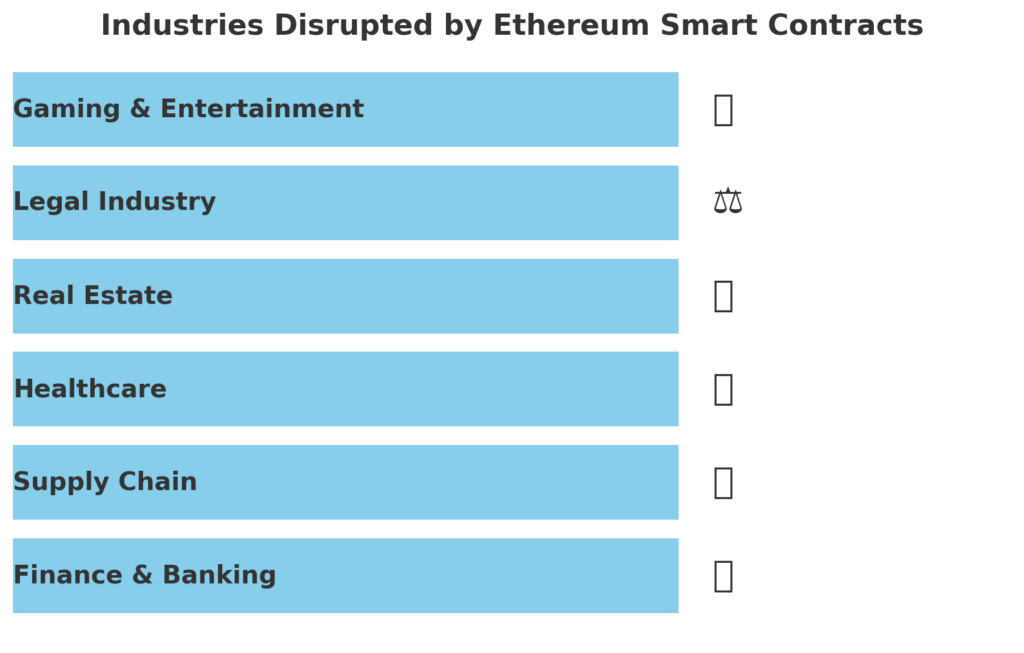Why Ethereum’s Smart Contracts Are Disrupting Every Industry
In a world driven by digital transformation, businesses are constantly seeking innovative solutions to enhance efficiency and security. Enter Ethereum’s smart contracts—self-executing agreements powered by blockchain technology that are reshaping industries from finance to healthcare. Imagine a system where transactions are automated, trust is built into the code, and intermediaries become obsolete. This article delves into the revolutionary impact of Ethereum’s smart contracts, exploring how they work, the industries they’re transforming, and why they are becoming the backbone of a decentralized future.
The Evolution of Smart Contracts
Smart contracts originated as a theoretical concept in the 1990s when computer scientist Nick Szabo first introduced the idea. However, it wasn’t until the launch of Ethereum in 2015 that smart contracts became a practical reality. Unlike traditional contracts that require intermediaries like lawyers or brokers, smart contracts are self-executing agreements with terms written directly into code. This code runs on the Ethereum blockchain, making transactions automatic, secure, and transparent. The removal of middlemen reduces costs, minimizes the risk of human error, and accelerates processes.
How Ethereum’s Smart Contracts Work
Ethereum’s smart contracts operate on its decentralized blockchain network. They are programmed with specific conditions that trigger actions automatically when met. For example, a smart contract for a rental agreement can automatically release payment to the landlord once the tenant confirms they’ve received the keys. Decentralized nodes on the Ethereum network verify these transactions, ensuring they are secure, transparent, and tamper-proof. Since the contracts are immutable, once deployed, their terms cannot be altered, providing an additional layer of trust and security.
Key Industries Disrupted by Ethereum’s Smart Contracts

- Finance and Banking
Ethereum’s smart contracts have revolutionized the financial sector through Decentralized Finance (DeFi) applications. They automate processes like payments, loans, and insurance claims, eliminating the need for banks and financial institutions as intermediaries. This leads to faster transactions, lower fees, and greater financial inclusion, allowing people without access to traditional banking systems to participate in the global economy. - Supply Chain Management
In supply chain management, smart contracts improve transparency and efficiency. They enable real-time tracking of goods from origin to delivery, reducing the risk of fraud and errors. For instance, a smart contract can automatically verify the authenticity of a product, update stakeholders at each stage, and release payments once delivery conditions are met. - Healthcare
Healthcare organizations use smart contracts to secure patient data, streamline administrative tasks, and expedite insurance claims. These contracts ensure that sensitive medical records are only accessible to authorized parties, enhancing data privacy. Additionally, they automate processes like patient consent forms and insurance verifications, reducing administrative burdens and errors. - Real Estate
Real estate transactions often involve lengthy paperwork and intermediaries like brokers and escrow agents. Smart contracts simplify this process by automating agreements, verifying ownership, and executing transactions once conditions are met. This reduces transaction costs, speeds up the buying/selling process, and minimizes the risk of fraud. - Legal Industry
The legal industry benefits from smart contracts through automation of routine legal processes such as contract execution, compliance monitoring, and dispute resolution. By embedding legal terms into code, smart contracts reduce the need for constant legal oversight, lower legal fees, and ensure that agreements are executed exactly as written without the potential for human bias or error. - Gaming and Entertainment
In the gaming and entertainment sectors, smart contracts support digital asset ownership, secure in-game transactions, and ensure fair gameplay. They also facilitate transparent royalty distribution, ensuring artists and creators receive their due earnings without delays or disputes. Smart contracts can govern licensing agreements and track usage, providing greater control over intellectual property rights.
Benefits of Ethereum’s Smart Contracts

- Automation: Smart contracts automatically execute actions when predefined conditions are met, eliminating the need for manual intervention.
- Transparency: All transactions are recorded on the blockchain, allowing all parties to access the same verifiable information, which enhances trust.
- Security: The decentralized and encrypted nature of blockchain technology ensures data integrity, making smart contracts highly secure and tamper-proof.
- Cost-Efficiency: By removing intermediaries, smart contracts reduce transaction fees and administrative costs, making processes more economical.
Challenges and Limitations
- Scalability Issues: Ethereum’s network can experience congestion, leading to slower transaction times and higher fees during peak periods.
- Complexity: Writing secure and bug-free smart contract code requires specialized knowledge. Coding errors can lead to vulnerabilities, as seen in high-profile blockchain hacks.
- Regulatory Uncertainty: The legal status of smart contracts varies across jurisdictions, and evolving regulations may impact their adoption and enforceability.
Future Prospects of Ethereum’s Smart Contracts
The future of smart contracts looks promising, especially with the rollout of Ethereum 2.0, which aims to improve scalability, speed, and energy efficiency. As industries adopt blockchain technology, smart contracts will likely integrate with emerging technologies like the Internet of Things (IoT) and Artificial Intelligence (AI). This convergence could lead to new applications, such as automated supply chains that respond to real-time data and smart legal contracts that adapt to changing regulations.
Conclusion:
In conclusion, Ethereum’s smart contracts are not just a technological innovation—they are a game-changer, revolutionizing how industries operate across the globe. By automating processes, enhancing security, and eliminating intermediaries, they are paving the way for a more transparent and efficient future. Whether it’s finance, healthcare, real estate, or entertainment, the transformative potential of smart contracts is undeniable.
Reflect on how these advancements could impact your industry and consider exploring how to integrate this powerful technology into your operations. If you found this article insightful, share it with your network, leave a comment with your thoughts, and don’t forget to check out Ethereum Official Website to dive deeper into the world of smart contracts.
Stay ahead of the curve, embrace the future of decentralized technology, and watch how Ethereum’s smart contracts continue to disrupt and redefine industries worldwide. [TechGeniuxio.com]





